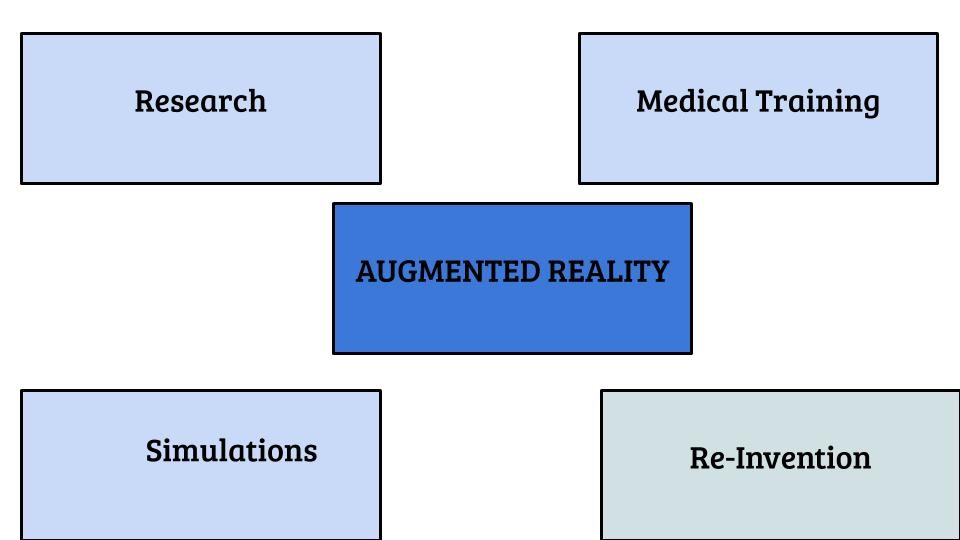
“I am convinced that this is not going to be an extension of cinema or 3-D cinema or video games. It is something new, different, and not experienced yet. The strange thing here is that normally, in the history of culture, we have new stories and narrations and then we start to develop a tool. Or we have visions of wondrous new architecture — like, let’s say, the museum in Bilbao, or the opera house in Sydney — and technology makes it possible to fulfil these dreams. So you have the content first, and then the technology follows suit. In this case, we do have a technology, but we don’t have any clear idea how to fill it with content.” ― Brendan Iribe, CEO Oculus Rift
Augmented Reality is one of those emerging Industry 4.0 topics that few individuals, unless you’re emerged in the gaming world, will readily appreciate. When it comes to the industrial realm, there are innovations to be made in areas such as healthcare, that you can rest assured will benefit your life one day. One of the things that we can do is envision a brighter future for ourselves, from all perspectives.
While delivery in all spheres of industry, inclusive of healthcare will vary, with time what was a dream, will become a standard. All fields are evolving in a fluid continuum. In the years to come, augmented reality will become an increasingly integral aspect of your daily life. Augmented reality is becoming more prevalent in spheres like the movies, where with the help of 3-D glasses, you can simply escape from the usual 2-D experience.
Within realms like medical care, young doctors and even practicing physicians will be able to utilize technology like augmented reality to visualize the human body, prior to actually operating on the body in reality. To ensure that your own specialists practice is increasing in efficiency, such technologies will provide you with personalized care and enhance their research ability due to more readily available data.
From a civilian perspective, persons are engaging with artificial intelligence in the forms of mediums such as Siri and Alexa in their homes. Current cars for instance, have bluetooth as a feature you can indulge in. Additionally, many cars built by manufacturers like Teslas come with in-built tablets that track everything from your favorite stations, to your morning route to work.
Eventually the systems learn your patterns, and make recommendations with respect to how your driving patterns should be, depending on your location. In the future cars will actually self-drive thanks to the advent of technologies being developed by companies like Tesla and Google. In much the same way, artificial intelligence and technologies such as virtual reality, will one day be standard practice in your industry.
For this example, we will delve into the medical industry’s drive to optimize its operational activities via the introduction of artificial intelligence. Artificial Intelligence is attributed to intelligence built into machines. Surgical robots such as the daVinci are actually helping to improve current surgical experiences, and to increase the quantity and quality of surgical output in a hospital.
Outside of the surgical scope the future will greet you with diagnostics software that will track your day to day performance, and virtual reality that will enable your doctor to visualize your surgery before it’s actually performed. Companies like Microsoft are currently in the process of developing the software that future doctors will use to assess patients prior to medical treatment.
How Artificial Intelligence and Augmented Reality Facilitate Operational Excellence
Quality is important in all fields. Within the medical realm, there are steps being taken by hospital systems to ensure that they are delivering standardized care. With the information age upon us…one key adage is the fact that “Data is the new Oil”. Current artificial intelligence is based on computer algorithms that were built ages ago, but are only finding their relevance in the modern day because the market is ready for them.
The same is true for augmented reality. Medical research is leaning towards incorporating readily available data into identifying critical decision making points in their decision making processes. As much as AI is a seeming buzz word, as more doctors embrace it for their operations, the more prevalent it will be for your treatments, when used in conjunction with augmented reality. Industry 4.0 is out to change the world, and it may well be part of your healing at a doctor near you.
What type of artificial intelligence and augmented reality will aid patient healing and improve quality of care?
- Software: Software in the medical field is constantly evolving. At this juncture in time, you may or may not notice doctors with a tablet of some sort. This tablet is devised to help them with collating notes, so that they don’t have to write them up after patient consultations. With the advent of technologies such as text to speech, consultations will be noted by an audio system, which will then take the notes and place them automatically on patient files. In surgeries for instance, software and augmented reality systems can do things like scan bodies, and an AI program map out the surgery based on a patient’s dimensions.
- Human-Inspired: AI that can understand your moods and emotions will be key to the healthcare decision making process. Wellness is more than just how you physically feel, so in the future mental health can be assessed by artificial intelligence.
With robotics, the quality and throughput of healthcare is evolving and as the new decade unfolds, everyone can envision what the future of your healthcare will be! It’s a brilliant world…if you take the time to process it. Utilizing all the mathematical tools including statistics, computer algorithms, artificial neural networks, augmented reality and robotics, the medical realm can prepare for improved operational excellence in their delivery.
Reference Article:
- The Future of Artificial Intelligence in Orthopaedics: https://ryortho.com/2019/04/the-future-of-artificial-intelligence-in-orthopedics/
